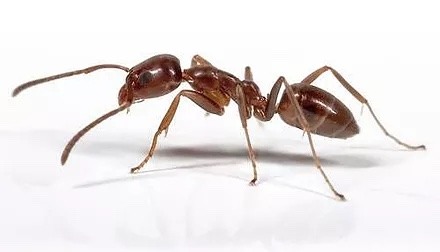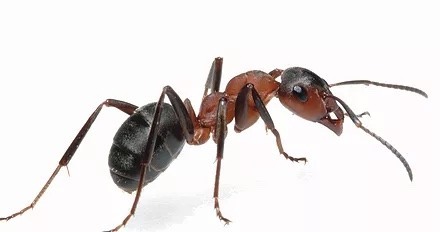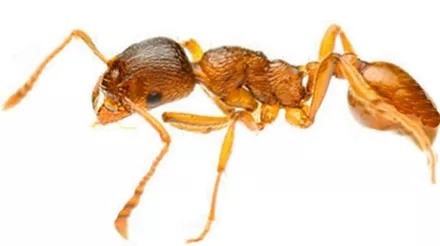Ant Control
Kennedy Pest provides full ant control solutions. All ants live in colonies, consisting of an egg-laying female (queen), short-lived males, and workers (sterile females). The ants you see foraging in your garden or kitchen are workers. Workers that find food communicate with other workers by depositing a chemical message on the ground as they crawl back to the nest. Although we cannot smell it, this “trail pheromone” sticks for long periods of time and helps other ants find the food at the end of the trail.
Fortunately, ant problems are entirely controllable under professional care. Typically, we use a chemical application outdoors and gel bait indoors. We have found this to be the most effective solution to ant infestations. When we bait indoors, there is no need to evacuate your home, no odor, and after the ants take the bait back to the nest your ants will be stopped at the source. Organic pesticides are also available, but not as reliable in controlling infestations.
So if you have an ant problem or want to make sure you don’t get one, count on us to break the pest life-cycle and prevent future infestations. For more information or to schedule a free consultation, please contact us today.


Argentine Ants
Description: Workers are about 1/16″ long and vary from light to dark brown. Similar in appearance to odorous house ants.
Habits: Usually located in moist situations near a food source. They can number in the hundreds or thousands per colony. Argentine ant colonies can join together, but usually aggressively eliminate other ant species. Workers follow regular trails. May tend aphids or other honeydew producing insects for food. Prefer sweets but may feed on any types of foods.
Lifespan/Reproduction: From egg to adult averages 74 days, but can be as much as 141 days or as little as 33 days. Problems Encountered: Breed in large numbers and often invade structures in large numbers in very wet, very dry, or other changes in conditions. Can cross over filth, carrion, etc. carrying disease organisms. Often travel along tree limbs and fences entering the house where these touch the structure. Will often be found in kitchen and bathrooms looking for moisture.
Tips for Prevention: Keep plants, bushes, and trees free of aphids and scale. Ensure where possible that branches don’t touch the structure. Tubs, showers, and sink areas should be well caulked.

Odorous House Ants
Description: About 1/16-1/8″ long. Body is brown to black. Very similar in appearance to Argentine ants. When crushed, workers emit a disagreeable, rotten or ransid odor.
Habits: Inside, these ants usually construct their nests in wall voids, especially around hot water pipes and heaters, in crevices around sinks, cupboards, etc. They prefer sweets, but will also eat foods with high protein and grease.
Lifestyle/Reproduction: Multiple queens in colonies that may number several hundred to several thousand. Egg to adult is anywhere from 34-83 days in warm weather. Can go dormant in the winter. Generally 4-5 generations per year are produced. Both workers and queens can live for years.
Problems Encountered: These ants do not generally respond well to baits. Nests must be located and destroyed to achieve control.
Tips for Prevention: Eliminating food sources is helpful in the control of these pests. Keeping holes and openings caulked will also aid in prevention, but once established professional control is called for.

Pharaoh Ants
Description: About 1/16″ long (very small ant), body is pale varying from yellowish to reddish, profile is unevenly rounded.
Habits: Prefer to nest in warm areas near food and/or water. Nests are usually located in inaccessible areas often behind wal voids, behind baseboards, etc. May travel far from the nest in search of food, but do not trail as evenly as Argentine Ants. They feed largely on protein and carbohydrates.
Lifespan/Reproduction: Colonies tend to be large with workers numbering in the thousands to several hundred-thousand. New nests can be formed by “budding” with as few as 5 workers, 10 preadults, and one queen migrating from the original colony. This is why a partial kill of the nest results in more colonies being formed. It is approximately 38 days from egg to adult and workers live about 9-10 weeks with only about 10% foraging at any given time. Queens live about 4-12 months.
Problems Encountered: Residual sprays will not generally control pharaoh ant problems. Unless a nest is completely eliminated, pharaoh ants will form new nests and the problem will be aggravated. A good bait provided and properly applied by your pest control operator is the best means of eliminating this persistent pest.
Tips for Prevention: Little can be done to prevent infestations. Regular treatment outside can help eliminate nesting that might threaten to infest the interior of the structure. Keeping landscape free of clutter and debris is also helpful.

